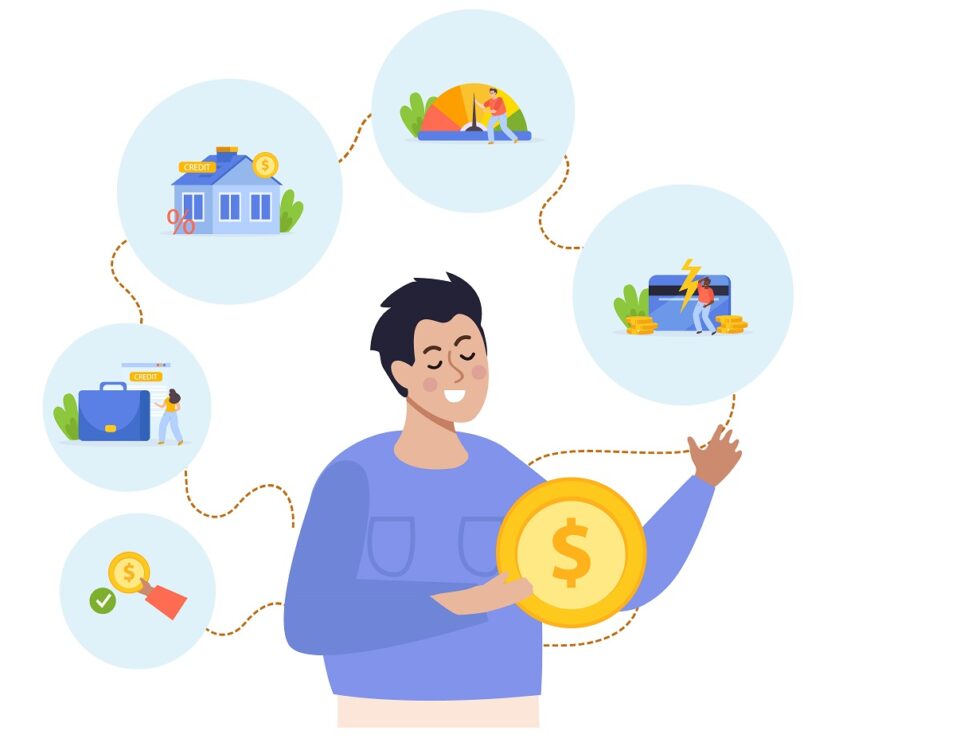- Credit Restoration Experts Nationwide

Is Your Credit Healing as Aging Derogatory Marks Lose Their Edge?
October 17, 2023
How to Repair Your Credit After Foreclosure
October 27, 2023How Much Can a Strong Payment History Boost Your Credit Score?

In the world of personal finance, few numbers wield as much power as the enigmatic three-digit figure known as your credit score. It’s the key that can unlock doors to your financial dreams or serve as a formidable roadblock on your path to prosperity. But what truly determines this magical number, and how much influence does one particular factor—your payment history—hold over it?
This blog is more like a journey of financial enlightenment, where you’ll explore the intricacies of credit scores and, more specifically, explore the remarkable impact of maintaining a strong payment history. In our credit repair programs, we uncover the mysteries behind credit scoring, understand the critical role played by your payment habits, and reveal just how many points your credit score can gain through a steadfast commitment to on-time payments.
So, if you’ve ever wondered about the tangible rewards of being punctual with your financial responsibilities, get ready to be amazed!
The Impact of Payment History on Credit Scores
When it comes to credit scores, few factors are as influential as your payment history. Your payment history serves as a window into your financial responsibility and reliability. It’s the record of how you’ve managed your credit accounts and debts over time. Let’s get into basics first!
How Credit Scores Are Calculated?
Credit scores are numerical representations of your creditworthiness. They provide lenders, creditors, and financial institutions with a quick assessment of the risk associated with lending you money or extending credit. Credit scoring models, such as FICO and VantageScore, use complex algorithms to evaluate various aspects of your credit report. While the exact formulas are closely guarded secrets, we do know that payment history is a significant factor. These models consider factors like:
- The number of on-time payments
- Late payments
- Missed payments
- The severity of delinquencies (e.g., 30 days late, 60 days late, etc.)
- The time since late payments occurred
A positive payment history, characterized by on-time payments and a lack of delinquencies, can significantly boost your credit score. Conversely, a history of late payments, missed payments, or accounts in collections can have a detrimental effect on your creditworthiness.
How Late Payments Affect Your Credit Score
Late payments, on the other hand, can have a detrimental impact on your credit score. The severity of this impact depends on several factors, including how late the payment is and how frequently you’ve missed payments. For instance:
- A payment that’s 30 days late may have a milder effect than a payment that’s 60 or 90 days late.
- Multiple late payments on various accounts can compound the damage.
- Late payments can remain on your credit report for up to seven years, affecting your credit score during that time.
Your payment history is a critical component of your credit score. Now, we’ll get deeper into the specifics of on-time payments and how late payments can impact your credit score.
Calculating the Gains: Points Your Credit Score Can Gain
Your credit score is like a financial report card that lenders use to assess your creditworthiness. It plays a significant role in determining your eligibility for loans, credit cards, and favorable interest rates. One of the most crucial factors that influence your credit score is your payment history, particularly your ability to make on-time payments. But how many points can your credit score actually gain through a strong payment history? Let’s break it down.
Understanding Credit Score Ranges
Credit scores typically fall within a range, with higher scores indicating better creditworthiness. The most commonly used credit scoring model is the FICO score, which ranges from 300 to 850. Here’s a general breakdown of credit score tiers:
- Poor: 300-579
- Fair: 580-669
- Good: 670-739
- Very Good: 740-799
- Excellent: 800-850
Now, let’s explore how a strong payment history can impact your credit score within this framework.
The Points Breakdown
- On-Time Payments: Making consistent, on-time payments is one of the most effective ways to boost your credit score. Payment history typically accounts for about 35% of your FICO score, making it the most influential factor.
- Point Gains: On-time payments can potentially lead to significant score increases. If you’ve had a history of late payments or missed payments, consistently paying on time can lead to noticeable improvements over time.
- Timeliness Matters: The more recent your on-time payments, the more impact they have on your credit score. Lenders tend to give greater weight to your recent financial behavior when assessing creditworthiness.
- Point Gains: Recent, consecutive on-time payments can have a more immediate and substantial effect on your credit score. A few months of timely payments can lead to noticeable score increases.
- Negative Entries: If you have a history of late payments, collections, or charge-offs, it may take longer to see significant point gains, even with consistent on-time payments. Negative entries can stay on your credit report for seven years, and their impact gradually diminishes over time.
- Point Gains: While it may take time to fully recover from negative entries, each month of on-time payments helps mitigate the damage and gradually improves your score.
- Credit Mix: Payment history isn’t the only factor influencing your credit score. Your credit mix (types of accounts) and credit utilization (credit card balances relative to credit limits) also play roles in your score.
- Point Gains: Diversifying your credit mix and maintaining low credit card balances can contribute to overall credit score improvement. These factors, combined with a strong payment history, can lead to more substantial point gains.
It’s important to note that credit scoring models can vary, and the precise point gains from a strong payment history may differ slightly between them. Additionally, individual credit profiles vary, so the impact of on-time payments can vary from person to person.
Factors That May Limit Point Gains
While a strong payment history is undeniably one of the most influential factors in determining your credit score, it’s essential to recognize that other variables can limit the number of points you can gain through this aspect alone. To have a complete understanding of credit score dynamics, let’s explore some of these factors:
- Other Negative Factors
- Collection Accounts: These can be more damaging than late payments.
- Bankruptcies: Even with a perfect payment history afterward, recovery can be slow.
- Foreclosures and Repossessions: Similarly impactful and require time to recover from.
- Late Payment Severity
- Frequency and Severity: More severe late payments have a more significant negative impact.
- Credit History Length
- Length of Credit History: Newer credit users may take longer to recover from late payments.
- Credit Utilization
- High Credit Card Balances: Paying down credit card debt helps but may take time.
- Credit Mix
- Limited Credit Types: A diverse credit mix is favored by credit scoring models.
- Recent Credit Inquiries
- New Credit Applications: Frequent applications can hurt your score due to hard inquiries.
- Length of Time Since Late Payments
- Aging of Late Payments: Late payments have less impact as they age.
- Accuracy of Reported Information
- Inaccurate Reporting: Errors in your credit report can limit point gains.
Understanding these factors of the credit fix program helps set realistic expectations for credit score improvement. While payment history is crucial, addressing other negative factors is often necessary for significant score increases and long-term financial success.

